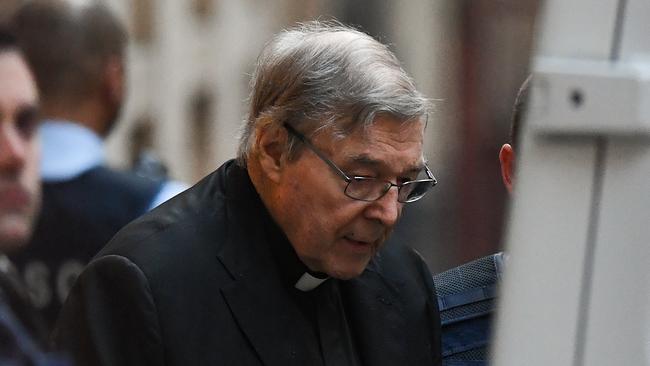Pell appeal judges weigh last-minute questions ahead of verdict
Failure to arraign George Pell in front of a jury may lead to a retrial, while his team prefer acquittal.

The Court of Appeal has been dealing with last-minute questions about the way George Pell’s jury was empanelled as it prepares to deliver its ruling on one of the nation’s biggest legal cases.
The three judges have been examining the law around how Pell was arraigned when no jury panel members were physically present in the court.
A video link was, however, in place when Pell was arraigned, which is normally the first time a criminal defendant appears in court. They hear the charges against them and normally submit a plea.
The failure to arraign Pell in front of the jury became one of three points of appeal lodged by the disgraced cardinal’s defence team.
If the court were to rule in favour of Pell on the arraignment matter, it could potentially lead to a retrial, although the favoured outcome for the defence would be that the court finds the jury had erred by convicting Pell on the five charges at St Patrick’s Cathedral in 1996 and 1997.
If this were to occur, it would lead to the convictions being overturned.
The third ground of appeal is whether County Court Chief Judge Peter Kidd erred by preventing the defence from using a computer-generated video that showed dots moving around a diagram of the layout of St Patrick’s Cathedral to describe human activity during and after a solemn mass.
The Court of Appeal will inevitably keep secret its innermost workings and deliberations over the Pell case with no one but the three judges having any idea how they will rule on the case.
It has been more than two months since the appeal was heard, meaning the judges will soon make public their deliberations. It is likely to be made this month, several legal sources have forecast.
Legal experts believe the judges have been in no rush to rule in part because of the gravity of the case and in part because of the distinct possibility that the High Court will be asked to rule on the matter, regardless of who wins the appeal.
Their deliberations also were interrupted by winter holidays.
The jury heard the first offences including Pell sexually assaulting two 13-year-old choirboys after Sunday mass at St Patrick’s most likely happened on either December 15 or December 22, 1996.
Pell orally penetrated one of the boys during this incident and indecently assaulted both of them.
Pell, the jury found, also offended early the next year when he forceably grabbed the sole surviving complainant’s genitals. The defence also has alleged that it could have occurred on November 3, 1996, throwing doubt about the date offered by the prosecution.
Pell, 78, was remanded in custody on February 27 and sentenced to a minimum three years and eight months.
He has steadfastly denied the offending. The evidence of the surviving choirboy may never be made public.
The victim was cross-examined in a closed court for many hours by Robert Richter QC, for Pell, and his evidence was crucial to the jury conviction.
The victim was widely reported to have been compelling in his evidence but it has not been publicly tested beyond the role of the court system.
The evidence was videotaped and played to the second jury.
And as is normal in sex abuse cases in Victoria, the complainant was guaranteed anonymity.


